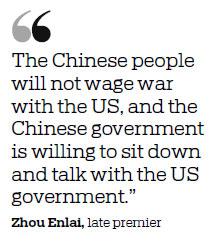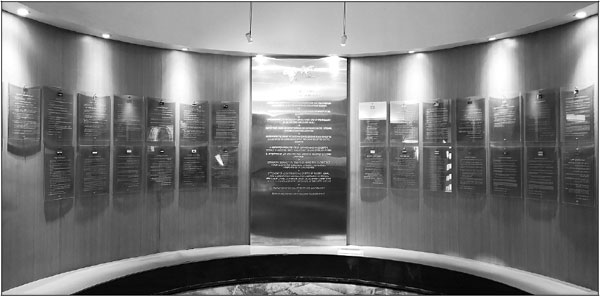How China turned tide at Bandung conference




Zhou Enlai's pursuit of common ground for peace brought about unity, cooperation
Editor's note: In "Footprint", a series of stories recalling important examples of China interacting with the rest of the world, we follow the country's path over the past seven decades.
Despite relief at having narrowly escaped a death plot targeting him, premier Zhou Enlai was aware of the need to ease mounting tension inside a conference hall in Bandung, Indonesia, in 1955.
Zhou was among representatives of 29 nations gathered in the Grand Hall of the Gedung Merdeka (Independence Building) on April 19 that year for the two-day plenary session of the First Asian-African Conference. He was leading a delegation from the People's Republic of China, which was founded in 1949.
|
The Ten Principles of the Bandung Conference are displayed in the languages of the 29 participating countries at the Museum of the Asian-African Conference in Bandung, Indonesia. Wen Zongduo / China Daily |
Zhou had been scheduled to take a chartered aircraft to the conference, but changed his plans to attend urgent talks en route in Burma, which changed its name to Myanmar in 1989.
However, there was an explosion on board the aircraft and it crash-landed in the South China Sea northwest of Borneo on April 11, killing all 11 passengers heading to the conference, including eight Chinese, and five of the eight-member crew.
Sitting in front of a wall of flags from all the countries attending the conference, the chairmen of the event, Indonesian president Sukarno and prime minister Ali Sastroamidjojo, sensed the unease among the audience.

Some speakers in their general statements spoke favorably of colonial powers and the United States, which made its presence felt with a large press contingent. Skeptics openly accused New China of subversive activities against its neighbors and labeled communism "neocolonial".
In the 1950s, Asian and African countries faced harsh challenges, according to Joe Thomas Karackattu, assistant professor with the Department of Humanities and Social Sciences at the Indian Institute of Technology Madras. In addition to rebuilding after World War II, nations emerging from Western colonization had to deal with the Cold War between the US and the Soviet Union. Some of these countries wanted nonalignment and idealism, but others sought to take sides.
Against this backdrop, Asian leaders started to seek a way to promote peace and cooperation. In April and May 1954, the prime ministers of Burma (U Nu), India (Jawaharlal Nehru), Indonesia (Ali Sastroamidjojo), Pakistan (Mohammad Ali Bogra) and Ceylon (John Kotelawala) met in Colombo, Ceylon's capital, and agreed to widen international cooperation to include newly independent African states. Ceylon changed its name to Sri Lanka in 1972.
They met again in December 1954 in Bogor, Indonesia, sponsoring the First Asian-African Conference, or Bandung Conference, to be held in Bandung the following year. The event was proposed by Sukarno.
When the conference began on April 18, 1955, Sukarno in his opening speech titled "Let a New Asia and a New Africa be Born", stated, "Our task is first to seek an understanding of each other."
His voice still reverberates through loudspeakers in the Museum of the Asian-African Conference in Bandung, which exhibits a lifesize wax figure of Sukarno delivering the speech.

But divisive remarks and opposition to China on the first day of the conference appeared to be sidetracking the event.
Zhou and his aides acted promptly, according to the Ministry of Foreign Affairs. Instead of delivering his prepared speech, he had a written statement circulated. Explaining it later, he said, "The Chinese delegation has come here to seek unity and not to quarrel, to seek common ground and not to create divergences.
"All the Asian and African countries gained their independence from colonialist rule, whether these countries are led by communists or nationalists. We should seek to understand each other and respect each other, sympathize with and support one another, and the Five Principles of Peaceful Co-Existence may completely serve as a basis for us to establish relations of friendship, cooperation and good neighborliness."
The Chinese move won widespread acclaim and was cited as a turning point for the conference's eventual success by Ali Sastroamidjojo, who later helped Zhou with dishes at a buffet. A picture of the pair at the buffet hangs on a wall at the Bandung museum.
Lai Hongyi, associate professor at the Faculty of Social Sciences at the University of Nottingham in the United Kingdom, credited Zhou's "skillful diplomacy" for helping China reach out to newly independent African and Asian nations.
A report in the US newspaper the St. Louis Post-Dispatch filed from Bandung in April 1955 and exhibited at the museum is headlined "Chou's Asian Politeness Proves Effective at Bandung." Zhou's name used to be spelled as Chou En Lai.
Hoo Tiang Boon, assistant professor with the China Program at Nanyang Technological University in Singapore, considers the Bandung Conference "a coming out event for China", as the country's concepts of cooperation and friendship won popular support.
The conference became embroiled in heated closed-door panel discussions, and on April 23, Zhou expounded further on the Five Principles of Peaceful Co-Existence, proposing the use of "living in peace" as a substitute for "co-existence".

At noon that day, during a meeting with seven other nations, Zhou made a brief but profound statement. "The Chinese people will not wage war with the US, and the Chinese government is willing to sit down and talk with the US government," he said. The statement was aimed at addressing tension in Asia and the Taiwan question. Zhou's comments prompted an air of optimism at the conference and throughout the world.
When the Bandung Conference ended on April 24, the Five Principles of Peaceful Co-Existence were incorporated into the Ten Principles of Bandung in the Final Communique of the Asian-African Conference, and adopted unanimously. Sukarno said, "No task is more urgent than that of preserving peace."
The Ten Principles are displayed on boards at the museum in the languages of all the countries that took part in the conference.
They specify: respect for human rights and the UN Charter; respect for territorial integrity; equality of all races; nonintervention in the internal affairs of another nation; the right to self-defense; abstention from mandatory collective defense; nonaggression; peaceful settlement of disputes; promotion of cooperation; and respect for justice and obligations. They were among global documents incorporated in UN declarations in 1970 and 1974.
For Lai, the Bandung Conference "ushered in a new era for the global role of the developing world".
"This was probably the first time the developing world had asserted its new identity and voice to the major players in global politics and economy," he said.
The Bandung Conference marked the start of a new round of decolonization and intense promotion of cooperation among Asian and African countries. A display at the Bandung museum shows that in the following decade alone, 36 new nations emerged from colonial rule. A series of related conferences were held in Bandung and elsewhere to consolidate exchanges and unity between these countries.
Marzuki Alie, former speaker of the Indonesian People's Representative Council, said that certain countries in Asia and Africa have learned from cooperation with China, adding, "Economic cooperation is an important key for nonaligned countries' relations."
He said that in addition to carrying on the "Bandung Spirit" with solidarity, friendship and cooperation at its core, "it is expected that Bandung 1955 can develop into economic cooperation for the common good".
The communique issued at the conference recognized the urgency of promoting economic development in Asia and Africa, he added, and such collaboration could be extended to include historical, cultural and even religious approaches.
The Bandung Spirit continues to spread. In 2005, on the 50th anniversary of the first conference, leaders of Asian and African countries met in Jakarta, the Indonesian capital, and Bandung to launch the New Asian-African Strategic Partnership.
During ceremonies marking the 60th anniversary in April 2015, President Xi Jinping told representatives from 109 countries that the Bandung Spirit remains relevant and potent, and the two "vibrant continents" of Asia and Africa could continue their time-tested partnership to build a more equitable and reasonable international order.
Xi joined Indonesian President Joko Widodo, former Indonesian president Megawati Sukarnoputri - Sukarno's daughter - and others in restaging a 100-meter "historic walk" taken by Asian and African leaders in 1955 from the Savoy Homann Hotel to the Gedung Merdeka.
The walls of the hotel, which hosted Bandung Conference guests, are adorned with photographs of the leaders and there is also a guestbook with the signatures of Zhou and other key figures. The book is displayed in a glass case.
Ismet Inono, the hotel's director, said, "It is fascinating to have this kind of book so that everyone can see it."
Gedung Merdeka has become a major tourist attraction, with the Museum of the Asian-African Conference inaugurated there in 1980. College student Siti Nurhayati spent her summer vacation this year as an intern at the museum, which lies in the bustling center of the university city. "The museum is the pride of Bandung," she said.
Studying at Sunan Gunung Djati State Islamic University Bandung, she said her internship had enabled her to learn more about the Bandung Conference and Zhou Enlai.
"It's important for the younger generation to learn from the lessons of history," she added.
Contact the writers at prime@chinadailyapac.com
(China Daily Global 10/08/2019 page1)















